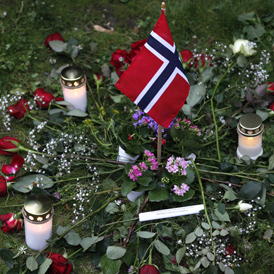Norway gunman ‘crimes against humanity’ charge
Anders Behring Breivik, who massacred at least 76 people in Norway on Friday, could be charged with crimes against humanity, a Norwegian law expert says.

Staale Eskeland, Professor of Criminal Law at Oslo University, said prosecutors will consider whether Anders Behring Breivik‘s crimes fall under a 2008 law on crimes against humanity.
Breivik massacred 68 people in a shooting spree on Utoya island on Friday, after killing eight in a bomb attack in the centre of Oslo.
Mr Eskeland said that “to kill a group of civilians systematically” is the basic criteria for the crimes against humanity charge. The maximum penalty is 30 years in jail.
Breivik has already been charged with “destabilising or destroying basic functions of society” and “creating serious fear in the population”. On Monday the court ruled that Breivik will be held on remand until 26 September. He will spend the first four weeks in complete isolation.
Police are also looking into Breivik’s claims that there are another two cells in his “organisation”, although a source close to the investigation said they believed this claim had “low credibility”.
Criticisms over response
The emergency services in Norway have faced criticism for acting too slowly to stop the tragedy. An armed SWAT team took more than an hour to reach Utoya island.
But Norwegian Justice Minister Knut Storberget defended their work today, saying it had been “fantastic”. He also rejected suggestions that an intelligence failure held the police back.

“I reject suggestions that we have not had the far-right under the microscope,” he said.
He added: “It is very important that we have an open and critical approach… but there is a time for everything.”
The police force also defended itself from suggestions that it should have identified the threat posed by Breivik sooner. The head of the PST Security Police said he would have escaped notice even by the feared Stasi police in former East Germany.
Breivik’s name appeared on a watch list only once, on a list of 50-60 Norwegians sent by Interpol after he was found to have paid money to a Polish chemicals company. The police found no reason to react to this information at the time.
Many Norwegians also appear to feel that their emergency services did what they could to stop the killer. At a rally of more than 100,000 people in Oslo on Monday, people applauded rescue workers.
“Evil can kill a person but never conquer a people,” the Norwegian Prime Minister, Jens Stoltenberg, told the rally last night.